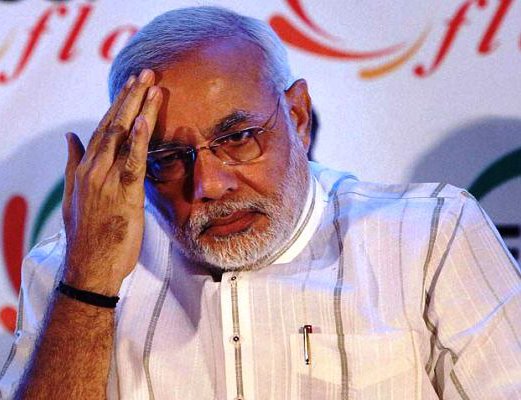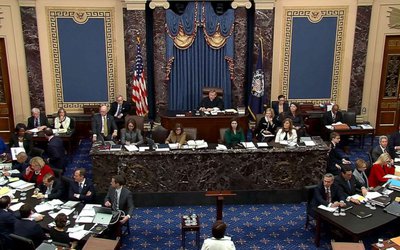
When Indian Prime Minister (PM) Narendra Modi visited Nepal last year, he was nothing short of a hero. The Indian PM, who is famous for giving a ‘rockstar’ touch to almost all his foreign sojourns, be it delivering an informal speech at New York’s Madison Square Garden or Sydney’s prestigious Allphones Arena, spoke in Nepali, greeted an ecstatic Nepali crowd in an impromptu move and offered 1 billion dollar line of credit. Modi wave had swept the nation.
Come one year later, the hero is now a villain. Anti - Modi slogans echo in streets and social media. There is an unprecedented level of resentment against India. Diplomatic relations between the two countries are at an all time low and the goodwill earned by the BJP strong man from two of his earlier visits, is all but gone. The culminating factor for this was the ‘unofficial blockade’. But in the larger context, it is much more than that. It is the Indian establishment’s disastrous foreign policy in its backyard.
While Modi’s foreign policy is touted to be highly successful thanks to the zillions of dollars worth of investment deals yielded from his visits, his policy in his own neighbourhood deserves a flak. The main problem is Delhi’s utter lack of sensitivity towards the aspirations of the people of smaller sovereign nations. Although the Indian PM’s stint in the office began on a positive note with commitments to ‘neighbours first’ policy, in reality he has been unable to rise above the narrow ‘Big Brother’ mentality. His foreign policy failure became visibly evident in Nepal but it is not the only case in point.
Earlier this year, the Modi government cleverly engineered the fall of Mahindra Rajapaksha in Sri Lanka and fielded Rajapaksha's own health minister Maithripala Sirisena against him. Delhi’s move signalled that there was no change in its ‘interventionist’ policy towards Sri Lanka, where it already has a poor record thanks to a history of external bickering and direct military interference. Despite committing to mutually beneficial relationship with neighbours, Modi is far from delivering on his words when it comes to another neighbour, Bangladesh. His visit to Dhaka did see numerous agreements on trade, which ironically are not much significant to Bangladesh’s interests. The deals were simply seen as a means for Sheikh Hasina regime to appease Delhi and secure a strong foothold for her government, which is criticized for lacking legitimacy. The Indian PM did nothing to address the controversial distribution of Teesta river water which is currently in India’s favour. Neither has Delhi any plans to lift its controversial ‘shoot - on - sight’ order in the Indo- Bangladesh border, which has led to deaths of many Bangladeshi civilians. As a result of these, Modi’s foreign policy has failed to erase the existing public resentment against India in Bangladesh.
In the island nation of the Maldives, where it strongly backed the 30 year tenure of President Maumoon Abdul Gayoom and subsequently the government of Mohamed Nasheed, India’s mounting pressure for the release of its blue eyed President Mohamed Nasheed is a sign that Modi’s policy on Maldives has swayed little from what he inherited from his predecessors. Although certain members of Nasheed’s Maldivian Democratic Party have asked for stronger support from India, its interventionist tendencies became so evident that the new Maldivian President Abdulla Yameen had to warn Indian foreign minister against any Indian interference in the islands’ affairs.
So what is driving this shoddy foreign policy? Clearly, the reason is India’s fear of Chinese influence in its backyard. And the fear is not without any basis. Under President Mahindra Rajapaksha, Chinese exports to Sri Lanka quadrupled to close to $4 billion, coming closer to Indian levels and Chinese investments were assured in mega infrastructure projects. In Bangladesh, China has overtaken India as Bangladesh’s top trading partner since 2005. More worryingly for India, China was the source of 82 percent of Bangladesh's arms purchases from 2009 to 2013. China is also helping Bangladesh upgrade its main Chittagong port. In the Maldives, the Chinese presence has been increasing over the years. The number of Chinese tourists visiting the island nation reached a record 3,30,000 in 2013. Earlier this year, the new government even passed a law allowing foreign investors to own land, which is seen to pave way for Chinese investments. China would also want to gain an upper hand in the Maldives given its strategic location in the Indian Ocean. In Nepal too, the Chinese wings have been spreading. In the fiscal year 2013/14, China surpassed India to become Nepal’s top foreign investor recording a 164 percent surge compared to the previous year. Professor Hu Shisheng, Director of the Institute of South and Southeast Asian and Oceanian Studies at China Institutes of Contemporary International Relations recently said that China sees Nepal as the most viable bridge between China and South Asia, increasing its importance even more.
In this context, instead of acting hastily out of panic, Modi should have strategically planned his backyard foreign policy. While it is natural for larger countries to vie for influence over smaller ones in global politics, Delhi’s muscle flexing, particularly in Nepal, cannot be justified by any means. The right thing for the BJP strongman to do would have been to adopt a soft diplomacy. Disrespecting smaller countries’ sovereignty to counter Chinese influence will continue to raise resentment against India.
- Ukrainian Crisis And The World (Dis)Order
- Apr 22, 2022
- China’s Cautious Steps In The Graveyard Of Empires
- Aug 18, 2021
- Foreign Aid On The Fence!
- Aug 08, 2021
- Communist Party of China centenary celebrations Reading between the lips
- Jul 14, 2021
- Second Wave Of Covid-19 In India: Deadly Blow To The Economy
- Jun 23, 2021
















